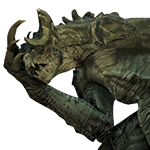In fact if I remember correctly the GM is encouraged to NOT explain them.
Yeah, no, maybe. All they have firmly stated is that
they're not going to explain them. The closest they come to this is in the GM section, "Realizing the Ninth World." From pages 354-355:
Describe, Don't Define
Because mystery is so important to weird, the Ninth World is never about strict definitions or concrete quantifications. "Describe, don't define" might be the number one rule. It not only leaves room for further development later, but it also keeps things mysterious and weird, and that's the most important characteristic of the setting.
Actually, perhaps the rule should be, "Describe rather than define, and if you msut define, never quantify." In other words, when talking about abhumans, I might describe them as "misshapen, brutish humanoids that live outside human society." However, you might have to distinguish (define) them from mutants at some point during a game, because in the Ninth World "mutant" means something different (some abhumans might be mutants, but not all mutants are abhumans ... but I digress). I would never say, "There are six types of abhumans, and they are..."
That kind of quantification is the death of mystery.
Make of it what you will.
(What, me? I think those are good general rules in communicating a setting to players. It doesn't mean you haven't figured it out for yourself though. And while I understand the reasoning, this is the main reason Numenera leaves me cold while I loved Planescape to death. I do want to know, so I can riff on it and fill in the gaps.)
I think the problem here is that, just like in Tides of Numenera, the writers actually have no fucking clue what the answers actually are. Like, I think it's actually good to have gaps that can be filled by imagination or speculated upon, but I think it's very important that the writers themselves have a firm grasp on what the actual answers actually are, how it all fits together, in order to be able to be evasive in a believable fashion, and consistently hinting towards various themes and ideas in a manner that makes sense - because they know the answers, the subtle hints and tangentially related events or exposés are always relevant, because somehow, it's all intended to tie together. And if, by chance, the writers and creative directors
don't know these answers, they need to work twice as hard to pretend that they actually do, constantly double-checking facts and hints and fluff.
In Numenera, though? I don't think Monte Cook has any fucking clue when or where humans actually appeared in the Ninth World, or what the previous 8 worlds actually were. It's created not as a mystery to be discovered or alluded to, but as an excuse for
"lol whatever" world-building. And I think that this is also a problem with Tides of Numenera. If Avellone is to be believed, he actually has no clue what The Nameless One's crime actually was, but at the same time, it's almost inconceivable that he wouldn't, based on the nature of Planescape: Torment, and how you can actually create an extremely consistent narrative of the previous incarnations, who followed who, who did what and when, and so on. We know that the Paranoid incarnation followed the Practical one, and so on.
Can the same be said about Tides of Numenera? No. There's the idea of the castoffs, but it merely serves as an excuse for throwaway narratives that are unconnected to the grand scope of things, despite what the game leads you to believe in the beginning (with the references to three distinct "incarnations" that subsequently became cast off, thousands of years ago, a couple of years ago, and just recently (which may or may not be you). Occasionally, you even seem to suffer "flashbacks" to other castoffs.. after they've been castoff, but it's never explained, and there's no rhyme or reason to it. It's just an event, not a chain of causality that is supposed to make sense if only you had all the pieces.
It's just a lose piece here, a lose piece there, and for all intents and purposes, they're not connected whatsoever. Saying
"each mystery just leads to more mysteries after resolving it" is fine, as long as you get to uncover mysteries that spur you on. Just saying
"it's mysterious for the sake of mystery and should never - will never - be explained" is
lazy as shit. It's like saying
"a wizard did it, lol" or
"nanobots, lol". It's like when that fat fuck in Game of Thrones responds to the question
"How can Samwell Tarly still be fat?" with
"The show has dragons, lol, why does anything have to make sense?" and it just makes me want to punch the actor's face in with a tire iron.
Beat the game in 16 hours (fast-forwarded through most dialogues) with a diplomatic character and Matkina, Rhis & Erritis.
The game is thoroughly mediocre in every aspect - graphics, mechanics, story, combat, amount of content, themes, music, pacing, characters and so on.
Enjoyable but unremarkable - 7/10.
"This game is entirely mediocre".
"7/10"
People like you should be put into gulags, and if commies went to election on that promise I'd actually vote for them.




















